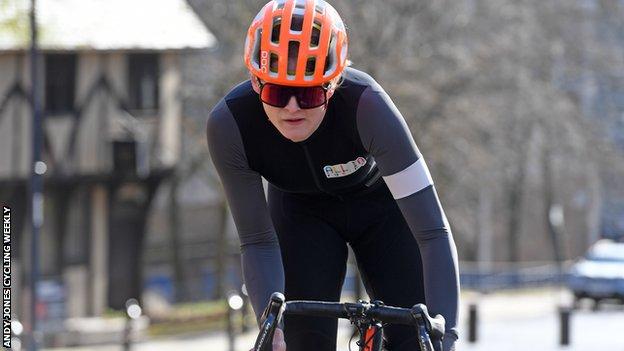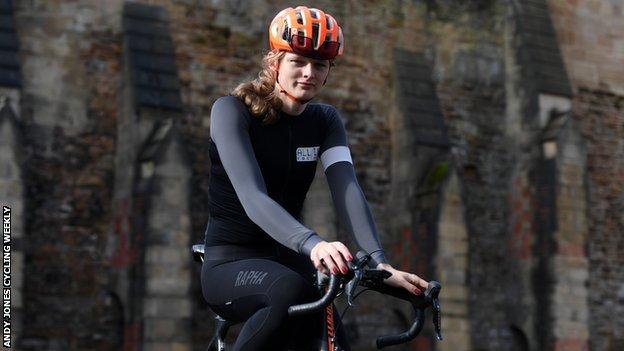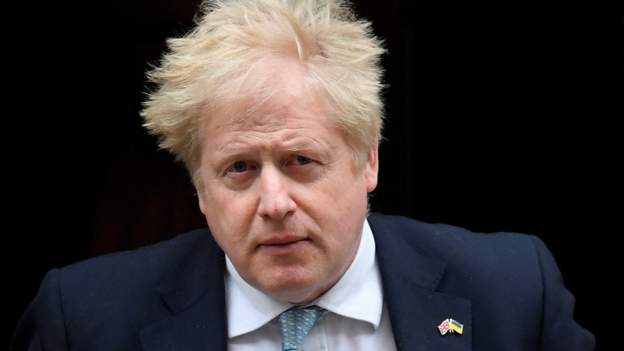Last updated on .From the section Sport

UK Prime Minister Boris Johnson says he does not believe transgender women should compete in female sporting events – a view he conceded may be “controversial”.
The issue of transgender athletes – centred around the balance of inclusion, sporting fairness and safety in women’s sport – has recently focused on the case of transgender cyclist Emily Bridges.
Bridges was recently ruled ineligible to compete in her first elite women’s race by cycling’s world governing body.
Johnson was speaking on a range of issues, including the government’s approach to the ban on so-called conversion therapy, before adding: “I don’t think biological males should be competing in female sporting events. Maybe that’s a controversial thing to say, but it just seems to me to be sensible.
“I also happen to think that women should have spaces – whether it’s in hospitals, prison or changing rooms – which are dedicated to women. That’s as far as my thinking has developed on this issue.
“If that puts me in conflict with some others, then we have got to work it all out. It doesn’t mean I’m not immensely sympathetic to people who want to change gender, to transition and it’s vital we give people the maximum love and support in making those decisions.
“These are complex issues and they can’t be solved with one swift, easy piece of legislation. It takes a lot of thought to get this right.”
In response to Johnson’s comments, LGBTQ+ charity Stonewall said: “Trans people deserve the same opportunities as everyone else to enjoy the benefits of sport and blanket exclusions on trans people participating are fundamentally unfair.
“This is a complex and fast-evolving issue and much of the science doesn’t yet exist in this area.
“Inclusion policies need to be considered on a sport by sport basis and it’s vital to avoid using inflammatory rhetoric, which often causes trans people to stop playing the sports they love.”
Stonewall said that although elite sport “often dominates these discussions”, transgender people are also “underrepresented in community sport” where they “often feel excluded”.
The organisation added: “Sport has the unique power to bring us together and it’s important trans people have the opportunity to enjoy the benefits of sport without facing exclusion or abuse.”
Female athletes ‘were ready to boycott’
Johnson’s comments came as a letter signed by a group of elite female cyclists – including retired Olympians, scientists and researchers – called on cycling’s world governing body, the UCI, to “rescind” its rules around transgender participation and testosterone levels and implement eligibility criteria for women “based on female biological characteristics”.
The letter – referring to the Bridges situation – said there was “deep regret” at the “crisis situation”, claiming female athletes in the UK “have shown you they were willing to boycott” in order for the UCI and British Cycling “to hear their concerns about fairness in their sport”.
The letter included the signature of Sara Symington, head of Olympic and Paralympic programmes at British Cycling. It states:
- The group says current transgender rules should be “rescinded” unless the UCI can provide “robust scientific evidence that the rules guarantee fairness for female athletes”
- Lower testosterone levels “cannot sufficiently mitigate all male sport advantage”
- Current rules are “asymmetric” and “discriminatory” and UCI needs to “better involve” the “independent voice of elite female athletes”
In response, British Cycling said: “We understand that this is an important issue for our staff and riders, which is why we have worked hard to provide forums for them to openly share their views on our policy and transgender inclusion more widely.
“These discussions are an important part of our commitment to learn and understand more about how the sport sector can achieve fairness in a way that maintains the dignity and respect of all athletes.”
In the aftermath of being prevented from competing in her first female race as a transgender woman, Bridges released a statement saying she felt “harassed and demonised” and had “little clarity” on her eligibility.
“I am an athlete and I just want to race competitively again. I hope they will reconsider their decision in line with the regulations,” she said.
“I’ve been relentlessly harassed and demonised by those who have a specific agenda to push.
“They attack anything that isn’t the norm. This is without care for the wellbeing of individuals or marginalised groups.”
Bridges says her privacy has also been “totally violated” and she has received “targeted abuse” on social media.
According to Cycling Weekly, Bridges has been participating in a study at Loughborough University to track her own power data with reduced testosterone levels – and says they show a 13-16% drop in her power outputs across different durations.
Bridges also says she has received a mixed response on speaking publicly about her transition, but added that many female cyclists have sent messages of support.
What happened in the Emily Bridges case?

Bridges, 21, had been set to race at Britain’s National Omnium Championships in Derby last weekend, which were won by Sophie Lewis.
She came out as transgender in October 2020 and began hormone therapy in 2021 as part of her gender dysphoria treatment. She had been allowed to enter women’s events by British Cycling because of her consistently lowered levels of testosterone.
British Cycling’s transgender regulations require riders to have had testosterone levels below five nanomoles per litre for a 12-month period prior to competition.
However, the UCI has not yet completed its own process around Bridges’ eligibility to race in international competitions – meaning she could not participate.
The UCI rules on transgender inclusion also state it must “protect health and safety” and “guarantee fair and meaningful competition that displays and rewards the fundamental values and meaning of the sport”.
BBC Sport understands senior figures in cycling believe these discretions are relevant in Bridges’ case.
In May 2021 – while still transitioning and racing in male events – she finished 43rd out of 45 riders in the elite men’s criterium at the Loughborough Cycling Festival and in September she was second to last in the Welsh National Championship road race, a 12km lap behind the winner.
Last month, Bridges won a men’s points race at the British Universities Championships in Glasgow – her final men’s race.
Following the UCI decision on Bridges, British Cycling said it “fully recognises her disappointment” but called for “a coalition” across a number of sports – involving governing bodies, athletes, the transgender and non-binary athlete community and the government – to work together to “find a better answer” in a way which “maintains the dignity and respect of all athletes”.
British Cycling said: “We also understand that, in elite sports, the concept of fairness is essential. “Transgender and non-binary inclusion is bigger than one race and one athlete – it is a challenge for all elite sports.”
On the eve of the UCI’s decision on Bridges’ eligibility, UCI president David Lappartient told BBC Sport he was “worried” transgender athletes could affect the fairness of competition in cycling, and said current rules based on testosterone levels were “probably not enough”.
Lappartient said world cycling’s governing body “fully recognises the rights of transgender athletes to do sport”.
He added: “When I speak with some professors in medicine, some specialists, they say ‘yes your body probably has a memory already of what you are and so there is maybe some advantages’. Is it a bridge of fair competition?
“The question of fair competition is really a question we must put on the table and is it right to take part – when you do transition – at the highest level? Or do we have also to see if this affects the fairness of competition.
“I can also really understand some ladies saying: ‘OK, but we don’t accept this’. And today I also [have] the union of the women’s riders completely against this and challenging the UCI on this.
“So we are in between and we were challenged on all parts.”
The most recent International Olympic Committee guidance – updated in November 2021 after the Tokyo Olympics – said there should be no assumption that a transgender athlete automatically has an unfair advantage in female events.
It recommended that individual sports under the Olympic umbrella – such as athletics, weightlifting, gymnastics and swimming – make their own rules surrounding transgender athletes.
World Athletics has set five nanomoles per litre as its benchmark, with cycling set at below five nanomoles.
World Rugby has banned trans women from playing at elite level, while the Rugby Football Union’s domestic policy in England does allow trans women to play, under certain testosterone-based conditions.
However, the IOC guidelines have been criticised by some medical experts, 38 of whom signed a statement questioning the changes made to its policy around testosterone suppressants in transgender women.
The sporting body said relying on testosterone levels alone in female events was no longer deemed sufficient grounds to determine whether or not a competitor has an unfair advantage.
But some medical professionals said the guidance was drafted mainly from a human rights perspective with little consideration of medical and scientific issues.
There has also been new guidance around transgender inclusion in non-elite sport, created in 2021. It was published after an 18-month consultation and review of the existing research and was developed by Sport England, Sport Scotland, Sport Northern Ireland, Sport Wales and UK Sport.
It said that “for many sports, the inclusion of transgender people, fairness and safety cannot co-exist in a single competitive model”.
The report concluded that “testosterone suppression is unlikely to guarantee fairness between transgender women and natal females in gender-affected sports”.
And it added that there are “retained differences in strength, stamina and physique between the average woman compared with the average transgender woman or non-binary person registered male at birth”.
It challenged sport bodies to “think in innovative and creative ways to ensure nobody is left out”, and stipulates individual sports may need to choose between inclusion or “competitive fairness” – and safety if relevant.
The guidance suggests for those sports where safety or fairness could be compromised, the individual sports could create an “open” or “universal” category separate to male and female ones.
